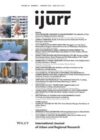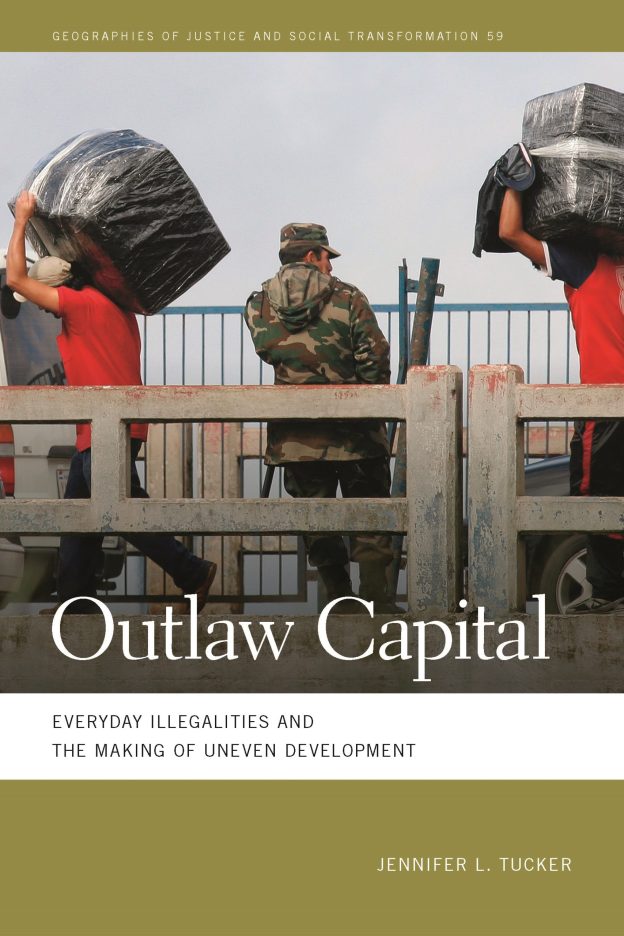Outlaw Capital is the result of ethnographic research conducted in the Paraguayan border city of Ciudad del Este. As a scholar specializing in Regional and Urban Planning, with a focus on the close connections between racialized inequalities and capitalist development, Jennifer L. Tucker has published extensively on informal labor and local governance within the context of neoliberal ideologies. This book weaves together a myriad of small stories and ‘everyday illegalities’, as Tucker describes them both here and in other works, linking them to broader conceptualizations of stateness, urbanism and development.
Tucker introduces the concept of ‘outlaw capital’ to critically analyze extralegal economies not as peripheral or deviant, but as central to the workings of global capitalism. She argues that outlaw capital is a distinct mode of accumulation characterized by deal-making, rule-breaking and the generation of ‘capture value’ instead of surplus value (p. 14) through informal networks, bribes and illicit transactions. Rather than viewing such economic activity as evidence of underdevelopment or moral failure, she positions it as integral to capitalist transformation and spatial production.
Drawing on the case of Ciudad del Este in Paraguay, a stigmatized border zone often portrayed as lawless, Tucker challenges dominant narratives that contrast ‘clean’ and ‘transgressive’ capital. She demonstrates how spaces commonly seen as emblematic of modernity, including shopping malls and special economic zones of production or trade, are deeply enmeshed in outlaw economies. The book critiques the racialized discourses that misinterpret global interconnections as localized criminality, showing how these framings obscure the structural role of illegality in global capitalism.
Central to Tucker’s analysis is the concept of blanqueamiento, or ‘whitening’, which Tucker defines as the racialized protection of elite illegality through class and proximity to whiteness. She argues that this process enables impunity for the powerful while masking outlaw capital as exceptional rather than foundational. In doing so, she shifts the focus from individual corruption to systemic relations of racial capitalism and globally circulating urban forms (i.e. shopping malls, frontier factories, standardized street vending facilities), where whiteness functions as a form of property and a mechanism for accumulation by transgression.
Tucker also underscores the global nature of outlaw capital, noting its presence in places often seen as financially pristine, such as Swiss banks or London real estate markets. One can think of examples of widespread corruption and elite illegalities leading to public outcries during the 2010s and early 2020s, when she reveals how global finance and outlaw capital are tightly interwoven, challenging myths of regulatory purity in the global North. Thus, outlaw capital and the related contraband urbanism examined in Ciudad de Este produce a multi-scalar arrangement of clean financial flows, masked by a process of whitening that stands in contrast to an outsourced, stigmatized and criminalized popular economy.
Tucker develops these arguments through an introduction, five ethnographically rich chapters and a conclusion. The researcher’s close proximity to interlocutors, field sites and subjects is evident throughout the book. Yet Tucker skillfully situates these intimate stories within a critical and well-organized revisitation of the (post)colonial history of the country and region, emphasizing how land and real estate ownership remain contested to this day. Demarcations of land ownership and property titles are subject not only to bureaucratic ambiguity but also to the strategic manipulation by and of state representatives, who even serve as tools of elite actors wielding ‘state power’ (Chapter 3). When Tucker recounts the struggles of anti-corruption activists, street vendors and their legal advocates against seemingly arbitrary land-use decisions, she employs a methodology of dense description and thick analysis to challenge the conventional equation of the state with law and order. Instead, as she powerfully asserts, ‘spatial confusion and legal trickery are not evidence of state incapacity but strategic modes of governing’, a dynamic that extends beyond Paraguay’s borders. As she writes, ‘the laundry list of elite illegalities laundered licit is a core dynamic building urban environments in many contexts’ (p. 92).
Despite, or perhaps because of, Tucker’s reflected positionality, which allows close observation of and reporting on vendors’ everyday struggles, the book never idealizes street vending economies. Quite the contrary. By contextualizing this globally observable mode of labor within the fissures of global urbanism and an ‘antipoor epistemology’ (p. 29), Tucker reveals how these structures leave an imprint on the embodied politics of street vendors. They reinforce social hierarchies familiar from other labor sectors and even exclude some individuals from these already marginalized spaces and opportunities for economic productivity.
Outlaw Capital offers a powerful critique of liberal capitalist assumptions and proposes a theoretical framework grounded in historical, spatial and detailed ethnographic analysis. Tucker calls on critical planning, urban sociology and geography as well as political economy scholars to move beyond mere interpretation, advocating for theories that can support transformative political action. Understanding and contesting the racialized politics of informality and illegality is essential, she asserts, for imagining and building more just futures.
Frank I. Müller, Universidade de São Paulo
Jennifer L. Tucker 2023: Outlaw Capital. Everyday Illegalities and the Making of Uneven Development. Athens, GA, University of Georgia Press.
Views expressed in this section are independent and do not represent the opinion of the editors.

